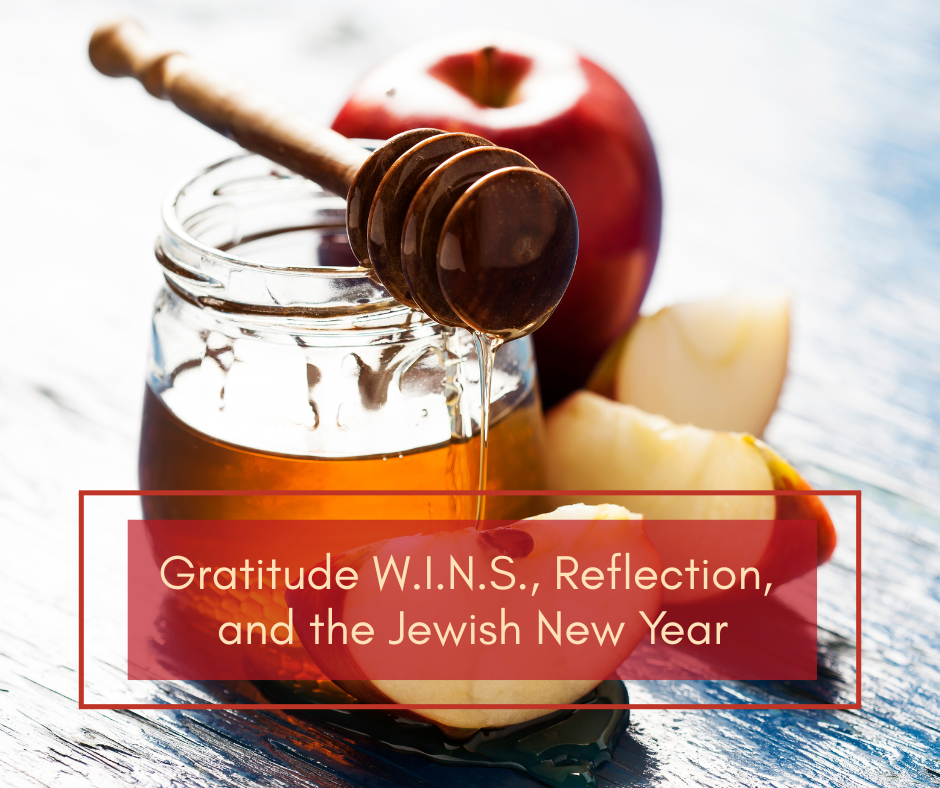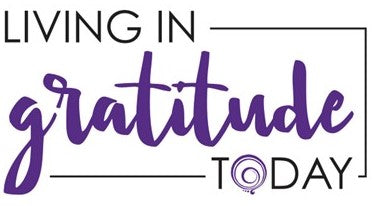
Gratitude W.I.N.S., Reflection, and the Jewish New Year
Share
How many times have you heard me talk about GRATITUDE W.I.N.S.?
If you’ve known me a while, you’ve probably heard it hundreds of times. One thing that sets me apart from other speakers on gratitude is that I add a self component. When reflecting on the “I” in W.I.N.S., you’re asked to answer the question:
👉 How did I make the world a little brighter?
This practice of self-reflection aligns beautifully with Jewish traditions during the High Holidays, which begin on Rosh HaShana (the Jewish New Year) and end on Yom Kippur (the Day of Atonement).
Confessing the Good Alongside the Bad
Each year on Yom Kippur, Jews recite the Viddui, a confessional prayer, ten times. It’s an alphabetical acrostic poem of possible sins one might have committed over the past year. During the prayer, worshipers tap their hearts as a symbolic reminder that harm starts in the heart.
Rabbi Uriel Romano (Temple Kol Ami, Plantation, FL) reminds us that while it’s important to recognize our transgressions (because when we know better, we do better), it’s equally vital to also confess the good—to name the ways we’ve practiced tikkun olam (repairing the world) and g’milut chasadim (acts of loving kindness).
This mirrors the purpose of the "I" in GRATITUDE W.I.N.S.: to recognize where we’ve made a positive difference in the world.
Examples of Good Deeds to “Confess”
Here are simple yet powerful ways to bring gratitude and kindness into daily life:
-
Appreciating nature 🌿
-
Befriending someone in need
-
Giving sincere compliments
-
Donating to charity
-
Teaching gratitude to children
-
Actively listening
-
Offering forgiveness
-
Visiting the elderly
-
Practicing daily GRATITUDE W.I.N.S.
-
Supporting a cause with passion
Acknowledging the good one does in the world is not an act of vanity. In addition to uplifting others, it boosts self-esteem, nurtures one's mental health, deepens compassion, and fosters stronger community connections.
A Different Kind of New Year
When you hear “Happy New Year,” you might think of January 1 with fireworks and champagne. But Rosh HaShana—the Jewish New Year—offers a very different type of celebration.
Instead of parties, it’s a time for reflection, repentance, and recommitment.
It’s said that on Rosh HaShana, G-d opens three books:
-
The Book of Life
-
The Book of Death
-
The Book of the Undecided
Over the next ten days, known as the Days of Awe, Jewish people wish each other, “L’shana Tova” (To a good year), and pray that they will be inscribed in the Book of Life.
Reflection and Teshuva (Repentance)
This season invites us to pause and ask hard questions:
- Was I unkind?
- Did I hurt someone's feelings?
- Did I physically hurt someone?
- Did I steal, shortchange, or overcharge someone?
- Did I cheat someone out of something?
- Did I gossip?
So, how does one change their fate and move their name to the Book of Life?
By DOING teshuva.
It's not enough to ask G-d for forgiveness; you need to ask the person you hurt.
Here's the catch; it's not a one-and-done. If the other person does not accept your apology for whatever reason, you need to ask again (at least three times). Maybe the first one wasn't heartfelt enough; you were just going through the motions. Perhaps they weren't ready to forgive you or wanted to make you grovel. Put your ego in check, and keep asking.
When you do teshuva, the hope is to learn from your mistakes, whether done consciously or unconsciously, so that you don't do them again. Teshuva clears the slate and puts us back on the path of righteousness.
So here's where I ask. If I have offended you, hurt you, or done something that upset you, please let me know so I can apologize and make amends.
Recommitment and Legacy
After reflection and repentance comes recommitment, the chance to start anew.
A few years ago, my aunt taught a class on the effect music has on prayer.
She ended the class with a song from Hamilton, "Finale (Who Lives, Who Dies, Who Tells Your Story)".
Click here and listen to the first 2 minutes, 19 seconds.
The chorus:
Who lives
Who dies
Who tells your story?
Eliza
And I’m still not through, I ask myself, “What would you do if you had more—”
Eliza
And when my time is up, have I done enough?
Eliza
Will they tell our story?
Oh. Can I show you what I’m proudest of?
Our actions today shape the story we leave behind. Once you do teshuva, you have a clean slate to recommitt, redefine your legacy, and contemplate how you want to leave the world a better place.
Whether you celebrate Rosh HaShana and Yom Kippur or you don't, you can adopt this practice of reflection, forgiveness, and recommittment. It’s an opportunity to step into the New Year with kindness and clarity.
Wishing You a Sweet Year
May this year be filled with love, joy, happiness, and an abundance of GRATITUDE W.I.N.S.
As we say: L’shana Tova — To a Happy Year.
